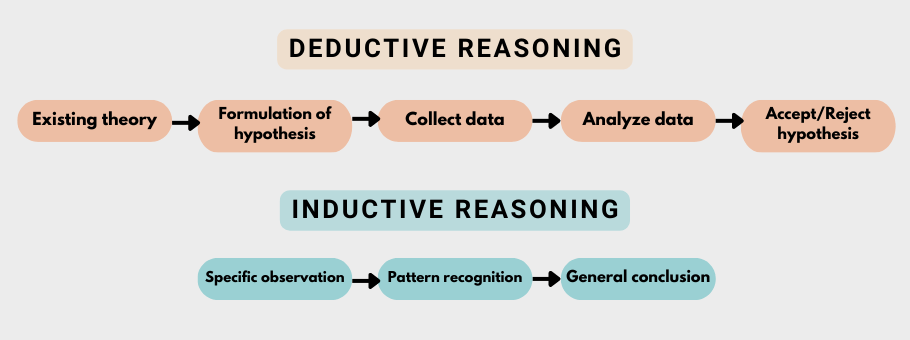Inductive and Deductive Reasoning — Strategic approach for conducting research

Karl questioned his research approach before finalizing the hypothesis of his research study. He laid a plan and a procedure that consists of steps of broad assumptions to detailed methods of data collection, analysis, and interpretation, wondering how to reason with your findings!
His supervisor provided him the insights about understanding his role in driving the research question by developing a research approach. The supervisor quoted, “In all the disciplines, research plays an essential role in allowing researchers to expand their theoretical knowledge in the field of their study to verify and justify the existing theories. A well-planned research approach will assist one in understanding and building a relationship between theory and objective of the research study.”
Obediently, Karl jotted down the keywords to research on the internet, understand the reasoning, and define the research approach for his research study.
What Is a Research Approach?
A research approach is a procedure selected by a researcher to collect, analyze, and interpret data. Based on the methods of data collection and data analysis, research approach methods are of three types: quantitative, qualitative, and mixed methods. However, considering the general plan and procedure for conducting a study, the research approach is divided into three categories:
1. Inductive Approach
The inductive approach begins with a researcher collecting data that is relevant to the research study. Post-data collection, a researcher will analyze this data broadly, looking for patterns in the data to develop a theory that could explain the patterns. Therefore, an inductive approach starts with a set of observations and then moves toward developing a theory.
2. Deductive Approach
The deductive approach is the reverse of the inductive approach. It always starts with a theory, such as one or more general statements or premises, and reaches a logical conclusion. Scientists use this type of reasoning approach to prove their research hypothesis.
3. Abductive Approach
This type of reasoning approach is set to answer the weakness associated with deductive and inductive approaches. While following the abductive reasoning approach, researchers start the process with surprising facts or puzzles while studying some empirical phenomena which cannot be explained with the existing theories. Abductive reasoning will assist researchers in explaining the facts or puzzles. Despite its popularity, the abductive approach is challenging to implement and researchers are advised to use traditional deductive or inductive approaches.
Inductive Vs Deductive Reasoning
|
Inductive Reasoning |
Deductive Reasoning |
| Inductive reasoning, also called induction, constructs or evaluates general prepositions derived from specific examples | Deductive reasoning is the process of reasoning from general statements to reach a logical conclusion |
| Arguments in inductive reasoning are strong or weak.
· Strong arguments are cogent if the premise is true. · Weak arguments are uncogent. |
Arguments in deductive reasoning are valid or invalid.
· If the logic is correct, then the argument is valid. · If there is no theory, then deductive reasoning cannot be conducted. |
| Conclusions may be incorrect even with strong arguments and true premises. | Conclusions could be proven valid if the premises are true. |
| Example of Inductive Reasoning:
Most men are right-handed. John is a man. Therefore, John must be right-handed. |
Example of Deductive Reasoning:
All men are mortal. John is a man. Therefore, John is mortal. |

What Is Inductive Reasoning?
Inductive reasoning moves away from more specific observations to broader generalizations and theories. Usually, this is against the scientific method, an empirical method of acquiring results based on experimental findings. Inductive reasoning makes generalizations by observing patterns and drawing inferences.
Inductive reasoning is based on strong and weak arguments. When the premise is true then the conclusion of the argument is likely to be true. Such an argument is termed a strong or cogent argument. Meanwhile, weak arguments may be false even if the premises they are based upon are true. An argument is a cogent argument if it is weak or the premise is false.
Types of Inductive Reasoning
1. Inductive Generalization
Inductive generalization uses observations about a sample to conclude the population from which the sample was chosen. In simple terms, you use statistical results from samples to make statements about populations. One can evaluate large samples or random sampling using inductive generalizations.
2. Statistical Generalization
Statistical generalization uses specific numbers to create statements about populations. This generalization is a subtype of inductive generalization, and it is also termed statistical syllogism.
3. Causal Reasoning
Causal reasoning links cause and effect between different aspects of the research study. A casual reasoning statement starts with a premise about two events that occur simultaneously, followed by choosing a specific direction of causality or refuting any other direction, and concluding a causal statement about the relationship between two things.
4. Sign Reasoning
Sign reasoning makes correlational connections between different things. Inductive reasoning works on a correlational relationship where nothing causes the other thing to occur. However, sign reasoning proposes that one event may be a ‘sign’ to impact another event’s occurrence.
5. Analogical Reasoning
Analogical reasoning concludes something based on its similarities to another thing. It links two things together and then concludes based on the attributes of one thing which holds for another thing. Analogical reasoning could be literal or figurative. However, literal comparison usually uses a much stronger case while reasoning.
Stages of Inductive Research Approach
- Begin with an observation
- Seek patterns in the observation
- Develop a theory or preliminary conclusion based on the patterns observed
Limitations of an Inductive Approach
A conclusion drawn based on inductive reasoning cannot be proven completely, but it can be invalidated.
What Is Deductive Reasoning?
Deductive reasoning starts with one or more general statements to derive a logical conclusion. Moreover, while conducting deductive research, a researcher starts with a theory. This theory could be derived from inductive reasoning. The approach of deductive reasoning is used to test the stated theory. If the general statement or theory is true, the conclusion derived is valid and vice-versa.
Deductive reasoning produces arguments that may be valid or invalid. If the logic is correct, conclusions flow from the general statement or theory and the arguments are valid. Researchers use deductive reasoning to prove their hypotheses. However, if there is no theory yet, then one cannot conduct deductive research.
Types of Deductive Reasoning
There are three common types of deductive reasoning:
1. Syllogism
Syllogism takes two conditional statements and forms a conclusion by combining the hypothesis of one statement with the conclusion of another. For example —
-
If brakes fail, the car does not stop.
-
If the car does not stop, it will cause an accident.
-
Therefore, brake failure causes the accident.
2. Modus Ponens
Modus ponens is another type of deductive reasoning that follows a pattern that affirms the condition of the reasoning. For example —
-
If a person is born after 1997, then they are a Gen Z
-
Ryan was born in 1998.
-
Therefore, Ryan belongs to Gen Z.
This type of reasoning affirms the previous statement. Meanwhile, the first premise sets the conditional statement to be affirmed.
3. Modus Tollens
Modus tollens is yet another type of deductive reasoning known as ‘the law of contrapositive’. It is the opposite of modus ponens because it negates the condition of the reasoning. For example —
-
If a person is born after 1997, then they are a Gen Z
-
Bruce is not a Gen Z.
-
Therefore, Bruce was not born after 1997.
Stages of Deductive Research Approach
- Begin with an existing theory and create a problem statement
- Formulate a hypothesis based on the existing theory
- Collect and analyze data to test the hypothesis
- Decide if you could reject or accept the hypothesis
Limitations of the Deductive Approach
The conclusions drawn from deductive reasoning can only be true if the theory set in the inductive study is true and the terms are clear.
Combination of Inductive and Deductive Reasoning in Research
When researchers conduct a large research project, they begin with an inductive study. This inductive reasoning assists them in constructing an efficient working theory. Therefore, post inductive reasoning, a deductive reasoning could confirm and conclude the working theory. This helps researchers formulate a structured project and mitigates the risk of research bias in the research study.
After doing thorough research in understanding inductive and deductive reasoning, Karl concluded that:
- Inductive reasoning is known for constructing hypotheses based on existing knowledge and predictions.
- Deductive reasoning could be used to test an inductive research approach.
- People tend to rely on information that is easily accessible and available in the world. While theorizing a research hypothesis, this tendency could introduce biases in the study.
- Inductive reasoning could cause biases which can distort the proper application of inductive argument.
- A good scientific research study must be highly focused and requires both inductive and deductive research approaches.
After a few hours of focused research, Karl understood his supervisor’s approach to creating a well-planned research hypothesis for his research study. Karl dived deeper and understood that he had only touched the tip of an iceberg, and there is much more to induce and deduce before he holds his doctorate!
Have you ever encountered a situation like Karl’s? Trying to understand which research approach to use? Did you find this blog informative? Do write to us or comment below and tell us what you feel!









![What is Academic Integrity and How to Uphold it [FREE CHECKLIST]](https://www.enago.com/academy/wp-content/uploads/2024/05/FeatureImages-73.png)